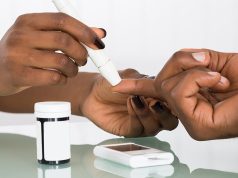By Beth Gilbert HealthDay Reporter
The annual meeting of the American Diabetes Association was held this year from June 20 to 23 in Chicago, drawing more than 15,000 participants, including clinicians, academicians, allied health professionals, and others interested in diabetes. The conference highlighted the latest advances in diabetes research and improving patient care, with presentations focusing on treatment recommendations and advances in management technology.
As part of the INHALE-1 study, Michael J. Haller, M.D., of the University of Florida in Gainesville, and colleagues found that inhaled insulin is safe and effective for use among children with type 1 diabetes.
The authors randomly assigned 230 children with type 1 diabetes using basal injected insulin to either placebo or inhaled insulin (Afrezza) as a replacement for rapid-acting meal insulin. The researchers found that Afrezza was no different than rapid-acting analogue (RAA)-injected insulin with regards to hemoglobin (Hb)A1c at 26 weeks, with no concerning safety signals. In addition, children on Afrezza experienced less weight gain compared with those on RAA. Both children and their parents indicated higher satisfaction scores with Afrezza compared with RAA insulin.
“Following what will hopefully be U.S. Food and Drug Administration approval for the use of Afrezza in pediatrics, I expect use of Afrezza in youth with type 1 diabetes will increase markedly. Once [it is] labeled and FDA-approved, we will have more meaningful opportunities to explore the many anecdotal use cases for inhaled insulin,” Haller said. “As just a few examples, use of inhaled insulin in new-onset diabetes, use of Afrezza to optimize management with exercise, and use of inhaled insulin in collaboration with automated insulin delivery systems are all opportunities in which inhaled insulin may offer important advantages and provide additional important options to optimize control for youth with diabetes.”
The study was funded by MannKind, the manufacturer of Afrezza.
In another study, Nestoras Mathioudakis, M.D., of the Johns Hopkins University School of Medicine in Baltimore, and colleagues found that a fully automated artificial intelligence (AI)-based Diabetes Prevention Program (DPP) is just as effective as human-delivered DPP in reducing type 2 diabetes risk among adults with overweight/obesity and prediabetes.
In a randomized controlled trial, the authors evaluated a fully autonomous AI-based behavioral intervention (i.e., no human coaching or oversight) against an established gold standard in medicine. They also assessed an AI-based lifestyle intervention and an active comparator representing the current standard of care for diabetes prevention: the human-coach-based DPP. The AI-based DPP tested in this trial was fully automated, incorporating a reinforcement learning algorithm to deliver hyperpersonalized just-in-time adaptive interventions based on user behavior and context.
The researchers found that a fully automated AI-based DPP was comparable to the human-delivered DPP in achieving the U.S. Centers for Disease Control and Prevention benchmark for type 2 diabetes risk reduction among adults with prediabetes and overweight or obesity.
“These findings support the use of a fully automated AI-based DPP as a scalable alternative to human-delivered programs. This modality may be especially beneficial for individuals who face logistical, geographic, or personal barriers to participating in traditional DPPs, and could help expand access to diabetes prevention in underserved populations,” Mathioudakis said. “The next step to integration into routine practice is CDC recognition for fully AI-based programs under the Diabetes Prevention Recognition Program.”
Abstract No. 1956-LB
Felicia L. Steger, Ph.D., of the University of Kansas Medical Center in Kansas City, and colleagues found that two forms of intermittent fasting — intermittent energy restriction (IER) and time-restricted eating (TRE) — are both feasible and effective for patients with both type 2 diabetes and overweight/obesity.
In a randomized controlled trial, the authors enrolled 57 adults with type 2 diabetes and overweight/obesity to IER or TRE with energy restriction during a six-month period. The researchers found that changes in HbA1c were 0.5 to 0.6 percent and did not differ between the two groups. Both approaches led to significant weight loss as well.
The findings from the study warrant a larger, adequately powered trial to make definitive conclusions, but the changes observed are on a par with traditional weight management approaches and provide a feasible and effective alternate for those who struggle with daily dieting approaches, according to the researchers.
“There was no clear ‘winner’ among the two, though our study was not statistically powered to detect differences between groups. Rather, we wanted to collect preliminary data on the safety of these interventions, particularly for those with type 2 diabetes taking insulin,” Steger said. “Most participants — over 80 percent in IER and over 95 percent in TRE — completed the study, which speaks to their ability to follow the recommendations within each approach. Both groups also exceeded our minimum predetermined criteria for effectiveness for improving glycemic control of a reduction in HbA1c greater than 0.3 percent.”
One author disclosed ties to the weight-loss industry.
Abstract No. 1915-LB
In a microsimulation study, Elizabeth Staton, of Emory University in Atlanta, and colleagues found that expanding access to newer glucagon-like peptide-1 (GLP-1) receptor agonist medications could significantly improve health and prevent death for tens of millions of people globally.
The authors sought to assess the potential population health impact of making GLP-1 receptor agonist treatments universally available. They identified about 16 percent of the global population, 12 years of age or older, who met eligibility criteria for treatment with the GLP-1 receptor agonist semaglutide.
The researchers found that universal access to treatment with a GLP-1 receptor agonist could reduce five-year mortality by almost 7 percent, saving about 37.5 million lives. In addition, obesity prevalence could be reduced by just over 50 percent, meaning there would be about half a billion (565 million) fewer individuals with obesity and many more with lessened obesity severity.
“It is critical to generate additional evidence on the potential cost-effectiveness of such universal access, including specifically for key populations at the greatest risk for obesity- and diabetes-related complications. This is a research priority of the team I work with in the Emory Global Diabetes Research Center,” Staton said. “As a global simulation, our study’s primary implications are for population health agenda setting and policymakers. Steps should be taken to enhance access across the range of current barriers in order to realize the benefits of broad GLP-1 receptor agonist access.”
One author disclosed ties to Eli Lilly, and another disclosed ties to Pfizer.
Abstract No. 2043-LB
ADA: Insulin Efsitora Noninferior to Glargine for Reducing HbA1c in Adults With Type 2 Diabetes
FRIDAY, June 27, 2025 (HealthDay News) — Once-weekly insulin efsitora alpha (efsitora) is noninferior to once-daily insulin glargine for reducing glycated hemoglobin among adults with type 2 diabetes, according to a study published online June 25 in the New England Journal of Medicine to coincide with the annual meeting of the American Diabetes Association, held from June 20 to 23 in Chicago.
Read Full Text
ADA: Orforglipron Reduces Glycated Hemoglobin in Early Type 2 Diabetes
WEDNESDAY, June 25, 2025 (HealthDay News) — The oral small-molecule glucagon-like peptide-1 receptor agonist orforglipron reduced glycated hemoglobin over 40 weeks in adults with early type 2 diabetes, according to a study published online June 21 in the New England Journal of Medicine to coincide with the annual meeting of the American Diabetes Association, held from June 20 to 23 in Chicago.
Read Full Text
ADA: Weight Loss, Type 2 Diabetes Remission Up With Replacing Diet Drinks With Water
WEDNESDAY, June 25, 2025 (HealthDay News) — For adult women with overweight or obesity and type 2 diabetes, replacing diet beverages with water is associated with greater weight loss and type 2 diabetes remission, according to a study presented at the annual meeting of the American Diabetes Association, held from June 20 to 23 in Chicago.
Read Full Text
ADA: Ecnoglutide Yields Superior, Sustained Reduction in Body Weight
MONDAY, June 23, 2025 (HealthDay News) — For adults with obesity or overweight without diabetes, the novel cyclic adenosine monophosphate-biased glucagon-like peptide-1 receptor agonist ecnoglutide yields a superior and sustained reduction in body weight versus placebo, according to a study published online June 21 in The Lancet Diabetes & Endocrinology to coincide with the annual meeting of the American Diabetes Association, held from June 20 to 23 in Chicago.
Read Full Text
Copyright © 2025 HealthDay. All rights reserved.








